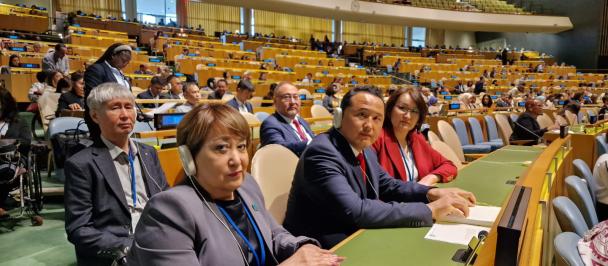UNDP experts assess progress in implementing UN Guiding Principles on Business and Human Rights in Kazakhstan
September 5, 2023

As part of the global initiative of the United Nations Development Programme (UNDP) in Kazakhstan, a National Baseline Assessment on Business and Human Rights (NBA) was conducted. The results of this assessment will serve as the foundation for the development of a National Action Plan aimed at strengthening the mechanisms for the protection of citizens (workers) rights and the implementation of the “UN Guiding Principles on Business and Human Rights” in Kazakhstan.
To assess the situation and understand the needs, problems and possibilities of the impact of business on human rights, the UNDP experts analysed the current level of implementation of these UN principles in Kazakhstani companies. The research also identified the most prevalent challenges faced in the realm of human rights by businesses and Kazakhstani enterprises across various sectors.The research employed such methods as desk analysis, interviews and focus groups with representatives from government agencies, businesses, and civil society, as well as an online survey of 278 enterprises and monitoring of 60 company websites, utilising the Corporate Human Rights Benchmark - Core methodology.
Respondents included employees of enterprises operating in the extractive industry, construction, agriculture and food processing, light industry, service and trade sector (including banking), transportation and logistics, energy, education, healthcare and others. A significant proportion of the respondents consisted of compliance officers (41.1 percent), lawyers or HR specialists (30.2 percent) and company management (17.6 percent).
As noted by UNDP experts, companies with public and foreign participation, as well as those whose shares are traded on stock exchanges, have demonstrated a high commitment to upholding human rights. They have established policies, procedures and mechanisms to respond to possible violations.Manufacturing companies and enterprises operating in sectors such as the extractive industry and agriculture, as well as the processing industry, have higher commitments in the context of human rights protection. While their primary focus is on safeguarding the rights of workers, these companies have relevant procedures and mechanisms for addressing complaints and implementing measures to restore violated rights.
Most companies use general procedures to detect, identify and assess the impact of their activities on human rights. Human rights violations are generally ranked as a risk with a medium or low degree of harm and likelihood, as indicated by reports and risk management analysis.
The study revealed that the most frequent concerns in Kazakhstani companies pertain to labor and labor relations, accounting for 40 percent of cases. This is closely followed by issues related to corporate management systems, such as inefficient resource management, lack of transparency, and accountability, which make up 35 percent of concerns.
The most frequently reported concern revolves around areas where improvements are needed in labor relations, including issues like adherence to work and rest hour regulations, wage-related matters, and workplace safety. It has been raised by 24 percent of the respondents. Furthermore, another aspect that requires attention is the safeguarding of citizens' rights. Approximately 8 percent of the participants have highlighted instances where citizens' rights could be better protected and promoted. Additionally, opportunities have been identified to strengthen efforts in addressing corruption-related matters, accounting for 5 percent of cases.
Half of the respondents (50 percent) share the opinion that it is up to the government to promote respect for human rights among businesses in Kazakhstan. A significant part (38 percent) believe it should be a shared responsibility. Less common are the opinions that it is up to: labour unions (20 percent), human rights and public organisations (16 percent), the enterprise itself (13 percent), business associations (10 percent) and mass media (4 percent).
The UN Human Rights Council has issued a call to all Member States, urging them to formulate National Action Plans on Business and Human Rights (NAPs) as a strategic approach to realizing the UN Guiding Principles. The "Business and Human Rights” project is part of a global initiative led by UNDP and the Government of Japan, aimed at tackling this issue and promoting responsible business standards. It is currently being implemented in 17 countries.

 Locations
Locations


